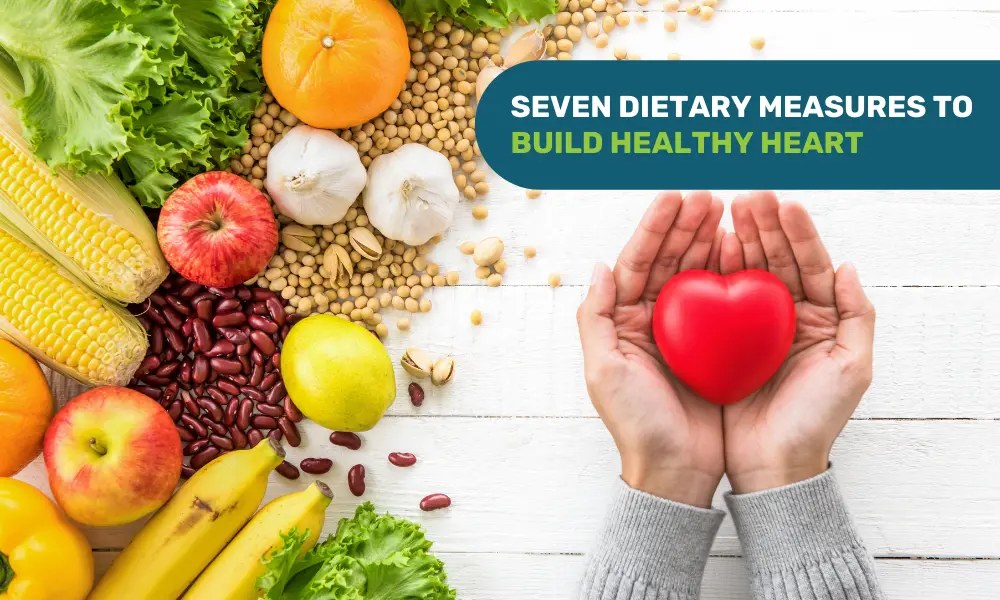Our heart is one of the most crucial organs in our body. Every September 29, the world observes World Heart Day to reflect on how we can keep our hearts healthy and strong.
Our in-house expert, Dt. Aparna Pandey, MSC-Nutrition and Dietetics, shares how a heart-healthy diet can be a simple yet powerful way to protect our most vital organs.
The heart works steadily and continuously to pump blood throughout your whole body to ensure that everything keeps on working properly. In today’s fast-paced, fast-food jungle, it’s easy to forget the proper diet for one’s heart. A healthy diet for your heart doesn’t have to be boring and can definitely be savory, filling, and fulfilling for the heart that beats for you. Here’s how to feed your heart with great, heart-friendly nutrition!
1. Power up with plant-based goodness: Fruits and veggies help increase your intake of vitamins, minerals, and antioxidants that can help control inflammation, reduce cholesterol, and otherwise keep the heart healthy. One must include a rainbow of colors on plate, this may include berries, leafy greens, carrots, bell peppers, and so much more. These foods are high in fiber, which helps lower levels of bad cholesterol and promotes good cardiovascular health.
Tip to try: Colorful salad with spinach, avocado, cherry tomatoes, and nuts, drizzled with olive oil for a heart-boosting lunch.
2. Healthy Fats: All fats are not created equal. Our heart loves unsaturated fats, which may help reduce cholesterol levels and chances of developing cardiovascular disease. One must add foods rich in omega-3 fatty acids to your diet, including salmon, flaxseeds, and walnuts. These healthy fats reduce inflammation and protect the arteries.
Tip to try: For good heart health, add a handful of flaxseeds or walnuts to your morning smoothie or oatmeal.
3. Include Whole Grains: Refined grains, including white bread and sugary cereals, raise blood sugar and are bad for heart health. Instead, opt for whole grains such as oats, quinoa, brown rice, and whole wheat. These whole grains are high in fiber and help lower cholesterol levels and control blood pressure.
Tip to try: Start your day with a warm bowl of oatmeal, topped off with fresh fruit, or add quinoa to some of that white rice in your favorite dishes.
4. Salt Intake: Too much salt raises blood pressure and pairs well with an increasing risk of heart disease. As you reduce salt, flavor your meals with fresh herbs, garlic, ginger, or lemon juice. Both will invigorate your taste buds, but neither will harm your heart.
Tip to try: Grill chicken with rosemary and lemon instead of using salt-laden marinades.
5. Lean Protein: Choose lean meats as your proteins, like chicken, turkey, beans, lentils, or tofu; however, limit the intake of fatty cuts of red meat saturated in fats that raise cholesterol levels.
Tip to try: Whip up a hearty bean chili or a chickpea salad for a satisfying, protein-rich meal.
6. Dark Chocolate: You read it right: dark chocolate can be good for your heart! Rich in antioxidants like flavonoids, dark chocolate (70% cocoa or higher) can improve blood flow and reduce blood pressure when enjoyed in moderation.
Tip to try: Enjoy a square or two of dark chocolate as a guilt-free dessert.
7. Drink Smart: What you drink also matters. Cut back on sugary drinks and soda and switch to pure water, herbal teas, or green tea. Green tea is rich in antioxidants, which boost cholesterol levels and promote heart health.
Tip to try: Brew yourself a cup of green tea with lemon for a supremely refreshing, healthy drink for the heart.
8. Control Portion Size: When you are eating heart-healthy foods, you can be sure that you’re feeding your body what it needs, but you want to control portions because overeating is unhealthy and keeps you from being the right weight. Only eat smaller portions of high-calorie foods; make sure your plate has some vegetables, lean protein, and whole grains.
Tip to try: To control portion sizes, use a smaller plate than unusual and fill half of it with vegetables.
9. Hydration: Water is an important component of heart health. It can help pump blood through your body effortlessly. So, stay hydrated and get in the habit of drinking water all through the day.
Tip to try: Ensure you have a water bottle sitting there as a reminder to drink.
Adding heart-friendly foods to our diet can help us enjoy food and health without sacrificing flavors. It’s the next best thing to make small, sustainable changes that add up. Your heart will thank you for it! For more professional tips, CLICK HERE.





